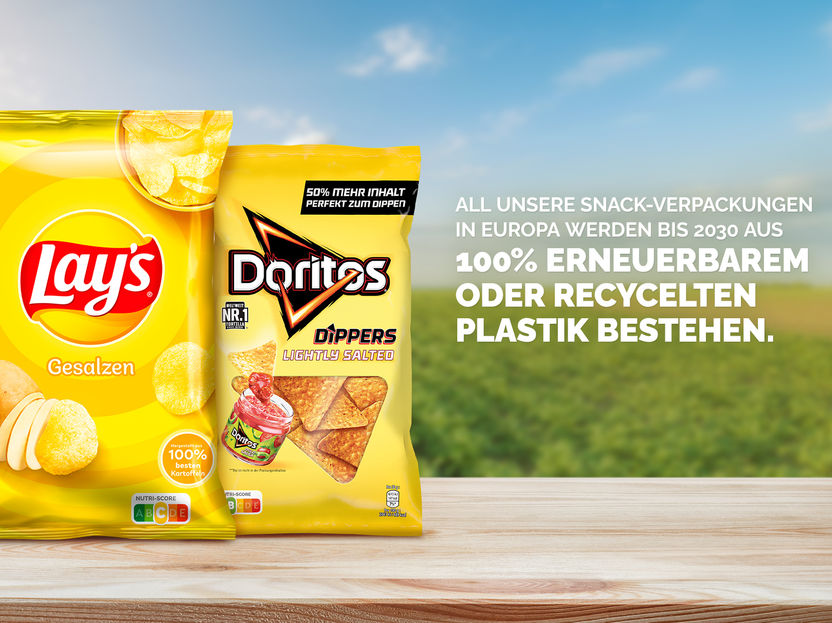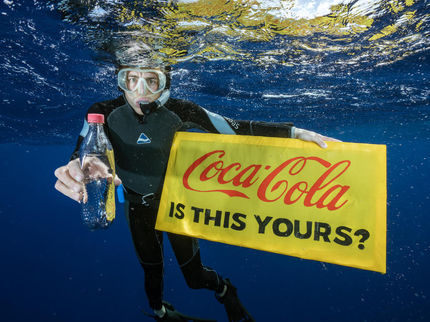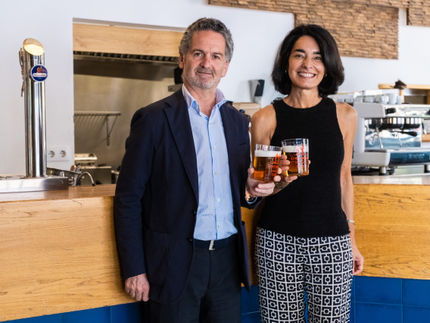Pleasure without new plastic: PepsiCo launches sustainable packaging for all snacks in Europe
Snack films to be 100 percent recycled or sustainable plastic by 2030
PepsiCo continues to drive the company's sustainable transformation. By 2030, the company will have eliminated the use of virgin plastic in all its snack packaging.[i] This goal applies to the Doritos and Lay's brands in the DACH region. To achieve this, only recycled or sustainable plastic is to be used in the manufacture of packaging in the future.

Indulgence without virgin plastic: PepsiCo introduces sustainable packaging for all snacks in Europe - snack films to be made of 100 percent recycled or sustainable plastic by 2030 - switch reduces greenhouse gas emissions by 40 percent - consumers to test new packaging starting this year
PepsiCo Deutschland GmbH
In the future, PepsiCo will switch to materials that are easier to recycle for the flexible packaging of snacks and chips. By using innovative technologies, PepsiCo is adapting the design of its packaging so that it contains greater proportions of recyclable plastics such as polypropylene, so-called monomaterials. PepsiCo is following the guidelines for recyclable design developed by the Circular Economy for Flexible Packaging (CEFLEX).
"We are working toward a future where flexible packaging is part of the circular economy. Together with PepsiCo, we have improved the material technologies of the new snack packs to make them easier to recycle. And we are beginning to integrate sustainable and recycled materials into PepsiCo's packaging. To meet the needs of customers like PepsiCo, we are also encouraging our upstream partners to invest in the supply chain of these new materials," says Gerald Rebitzer, Sustainability Director at AMCO, PepsiCo's European flexible packaging partner.
PepsiCo uses flexible plastic for the packaging of its snacks. Compared to other forms of packaging, these are particularly lightweight and therefore have a low carbon footprint. However, from PepsiCo's point of view, it is necessary to reduce the amount of new plastic in general and to strengthen the recyclability of flexible packaging. To achieve this, the company is focusing on various investments and innovations with its "Making Bags Better" program.
By 2030, PepsiCo aims to halve the amount of virgin plastics in its packaging per serving. To do this, the company is reducing the use of unnecessary packaging in its products. In markets such as the UK, PepsiCo has already succeeded in reducing the amount of material needed for the outer packaging of multipacks by up to 30 percent for some parts of its range. To also completely eliminate the use of virgin plastic in its snack and chip bags by 2030, PepsiCo is switching its packaging to 100 percent recycled or sustainable materials.
This year, for the first time, consumers* will have the opportunity to test these new packages in various European markets. In France, this applies to Lay's packaging made from waste vegetable products such as cooking oil or waste paper. In the UK, PepsiCo is testing packaging made from fully recycled materials with its Walker's brand. By switching to packaging materials that do not use fossil resources, PepsiCo estimates that greenhouse gas emissions per ton can be reduced by up to 40 percent[ii].
"Flexible packaging recycling should be the norm across Europe. We see a future where our bags are free of new fossil plastic. They will be part of a circular economy where flexible packaging is valuable and can be recycled to make new packaging. We are investing with our partners to build the technological capacity to deliver this. We now need appropriate regulatory guidance from policymakers to ensure that packaging never becomes waste," says Silviu Popovici, Chief Executive Officer of PepsiCo in Europe.
PepsiCo's goal is to establish a circularity for its bags and packaging. Therefore, company is focusing on strengthening the demand for recycled material, which consists of snack packaging. In addition, the company is also looking at the extent to which the packaging can be converted into plastic granules to be used, for example, in the manufacture of components in the automotive industry.
PepsiCo Europe is lobbying for ambitious recycling targets to be set for flexible plastic packaging across Europe. The company is also lobbying for the extension of landfill bans, as well as the rapid introduction of EPR (extended producer responsibility) fees across Europe to drive the collection, sorting and recycling of flexible films and ultimately the development of a circular economy for flexible plastics. PepsiCo is also investing in technologies to further improve sorting and recycling and is testing the use of smart packaging in Germany and France with several of its brands through 2022 as part of Holy Grail 2.0, a digital watermarking consortium.
Today's announcement is the latest step in the company's ambitious plans to create a world where packaging never becomes waste. The company previously unveiled its PepsiCo Positive sustainability strategy with ambitious plastic reduction targets.
"Through collaboration and innovation, we can find a path to a viable circular economy for our food packaging in Europe," said Archana Jagannathan, senior director, Sustainable Packaging, PepsiCo Europe. "Today, the supply of recycled and sustainable materials for flexible packaging is limited. The regulatory environment is very dynamic and we need more clarity on policies and recognized technologies. If the waste infrastructure policy direction evolves for flexible packaging similar to that for beverage bottles, we will accelerate our plans and reach our targets even faster."
[i] The target applies to PepsiCo's entire snack portfolio in Europe, with the exception of Duyvis nuts.
[ii] Based on a lifecycle assessment prepared by Franklin Associates, A Division of ERG, using a cut-off methodology, a mix of supplier and industry-provided data, and an estimated end-of-life scenario for 2030. This assessment includes credits for CO2 storage, credits for electricity generation from waste to energy, and credits for avoided legacy management.
Note: This article has been translated using a computer system without human intervention. LUMITOS offers these automatic translations to present a wider range of current news. Since this article has been translated with automatic translation, it is possible that it contains errors in vocabulary, syntax or grammar. The original article in German can be found here.





























































